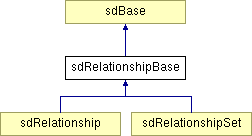 |
 |
 |
||||||
Inheritance diagram for sdRelationshipBase:

 |
Public Methods | |
| virtual | ~sdRelationshipBase () |
| unsigned int | getId () const |
| const std::string & | getName () const |
| const std::string & | getDescription () const |
| sdRelationshipSubType | getSubType () const |
| sdRelationshipOrderingType | getOrderType () const |
| sdRelationshipAssociationType | getAssociationType () const |
| sdRelationshipMultiplicityType | getMultiplicityType () const |
| sdRelationshipContainerType | getContainerType () const |
| ActionConstIter | begin () const |
| ActionConstIter | end () const |
Public Types | |
| typedef std::vector< sdRelationshipActionType > | Actions |
| typedef Actions::const_iterator | ActionConstIter |
|
|
|
|
|
|
|
|
This is the sdRelationshipBase destructor. |
|
|
This function returns a constant iterator that points to the first action of this relationship. |
|
|
This function returns a constant iterator that points to the last action of this relationship. |
|
|
This function returns the associationType of this sdRelationshipBase object. The associationType relates to how the objects are related. For example, a relationship might exist between two peers, or between an owning object and owned object. |
|
|
This function returns the containerType of this sdRelationshipBase object. The containerType defines how the related objects can be returned. For example, as a collection, an array, or a single object. |
|
|
This function returns the description of this sdRelationshipBase object. |
|
|
This function returns the ID of this sdRelationshipBase object. |
|
|
This function returns the multiplicityType of this sdRelationshipBase object. The multiplicityType relates to the number of 'to' objects in a relationship. For example, a relationship might be a one-to-one relationship, or a one-to-many relationship. |
|
|
This function returns the name of this sdRelationshipBase object. |
|
|
This function returns the orderType of this sdRelationshipBase object. The orderType relates to the ordering for the 'to' objects that would be returned on this relationship. For example, the ordering might be unordered or strictly ordered. |
|
|
This function returns the subType of this sdRelationshipBase object. The subType relates to the object or objects that are allowed for the 'to' part of the relationship. For example, there might be only a single object for the 'to' part of the relationship, or a set of valid objects might be allowed. |

Copyright © 2002 - 2010 Cadence Design Systems, Inc.
All Rights Reserved.